I don’t remember when and why I read Aristotle’s Poetics.
Might be one of those lazy afternoons in Kolkata’s Nandan complex library, where, after college, and after a couple shots (of tea!) down – I thought maybe Aristotle would give me a dummies guide to dramatic storytelling.
If I could use it, even in bits and parts, perhaps that could help me ‘impress’ the right kind of people and land the right kind of gigs. I truly don’t remember.
But I do remember where and how I met Santanu Bose for the first time.
It was year 1997, and I was working with Audio Visual Arts in Kolkata, my first paid job. Mallika Jalan, daughter of theater stalwart Shyamanand Jalan, owned the audio-visual production house. Besides corporate films, we created programming for Doordarshan and Zee TV – the only two options back then.
There, Santanu joined forces for a show called ‘Theater Directors at Work’. In that series for DD 3, we covered the creative ideas and working styles of eminent theater directors across the nation – including the likes of Badal Sircar, Habib Tanveer, Ratan Thiyam, Aleque Padamsee, Rudraprasad Sengupta … it’s a long list.

Back then, Santanu was a fresher from the Drama Studio, London, and I was a hopeless romantic involved deeply with theatre as a tool for political activism. We ended up liking each other, if I remember it right.
I loved him the way he was – eccentric yet methodical, intensely knowledgeable but forever prepared to demystify the most complex theories of drama to even imbeciles like me. I adored him because, despite being uncompromising, he never looked down upon anyone, and tried to bring the best out in everyone he met, and make best of each situation he encountered.
I respected him because I saw him, more than once, go out of the way to help others, even complete strangers. I can recollect one instance; it was one of our late edit sessions, and we met a rural family lost in the streets of Kolkata, wandering about in midnight near Park Circus, clueless about how to reach wherever they wanted to go.
Santanu gave them his share of taxi-fare and hitch-hiked back home, which used to be in far-away Howrah then, across the river Ganges.
I remember. I walked with him that night; and that’s only one of such incidents.
Yes, when it comes to Santanu Bose, I only have happy memories.
Apart from probably that one instance when he told me to do ‘light’ for his play ‘Agamemnon’ – at Rabindra Sadan, Kolkata. I wrongly numbered the dimmers in a hurry, forgot the colour scheme and the projection sequence, couldn’t set the overhead spot in sync with his movements – he is a trained Kathakali dancer, by the way.
That was a total disaster.
After coming to Delhi, I lost touch with theater – and with Santanu as well. I did meet him a couple times when he was teaching at SRFTI in Kolkata- at the turn of the millennium, but that’s all.
But now, since I am blogging, I thought maybe I should go meet him.
Also since I got to know that he is finally ‘excused’ of his eminently respectable (and largely boring) task of serving as the Dean (Academic) of NSD – and planning to return to theater direction and film making – with renewed gusto. So it felt just right – to bring together Greek classical theater and Santanu in my blog.
Least I could do to make up for my ‘Agamemnon’ goof-up.
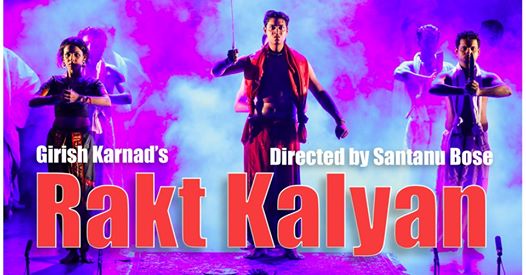
BACKSTAGE WITH BOSEBABA
The idea was to go backstage with Santanu again, for old time’s sake.
I have to admit, beyond the proscenium, things have changed, and haven’t. When and where I did theatre, everything used to be home-made. From using a local ‘darzi’ to sew Russian Red Army costumes to using earthen water pitchers as makeshift light-dimmers – we did whatever was needed. It wasn’t a choice – but a compulsion.
Technology has improved a lot, I admit. But somehow, back of the stage, it feels the same. That same flow of sharp energy; that overbearing love for the fantastic transformation on-stage; that will to shed inhibitions for the sake of becoming someone else; that same passion for a direct people to people storytelling – I felt all of that still remains the same.
That’s why theater becomes a lifelong habit for its aficionados. That hasn’t changed.
Let me show you a few backstage glimpses here, of Santanu’s latest venture, Girish Karnad’s much acclaimed classical play Raktkalyan.
These images are from its debut performance recently, at JNU.
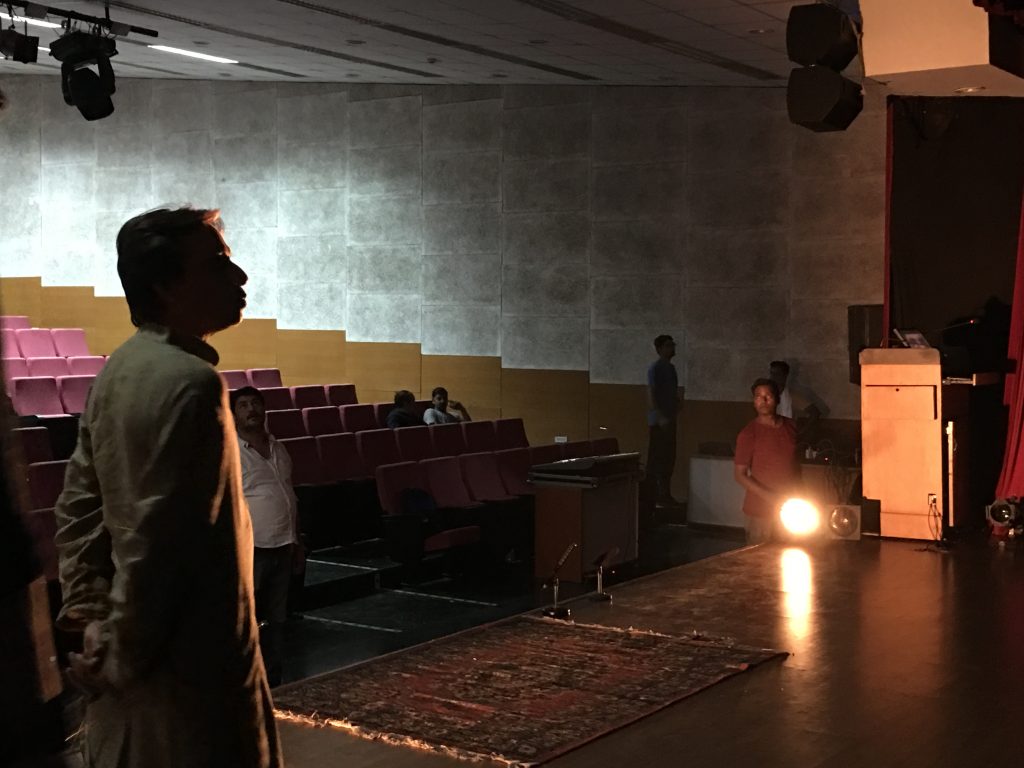
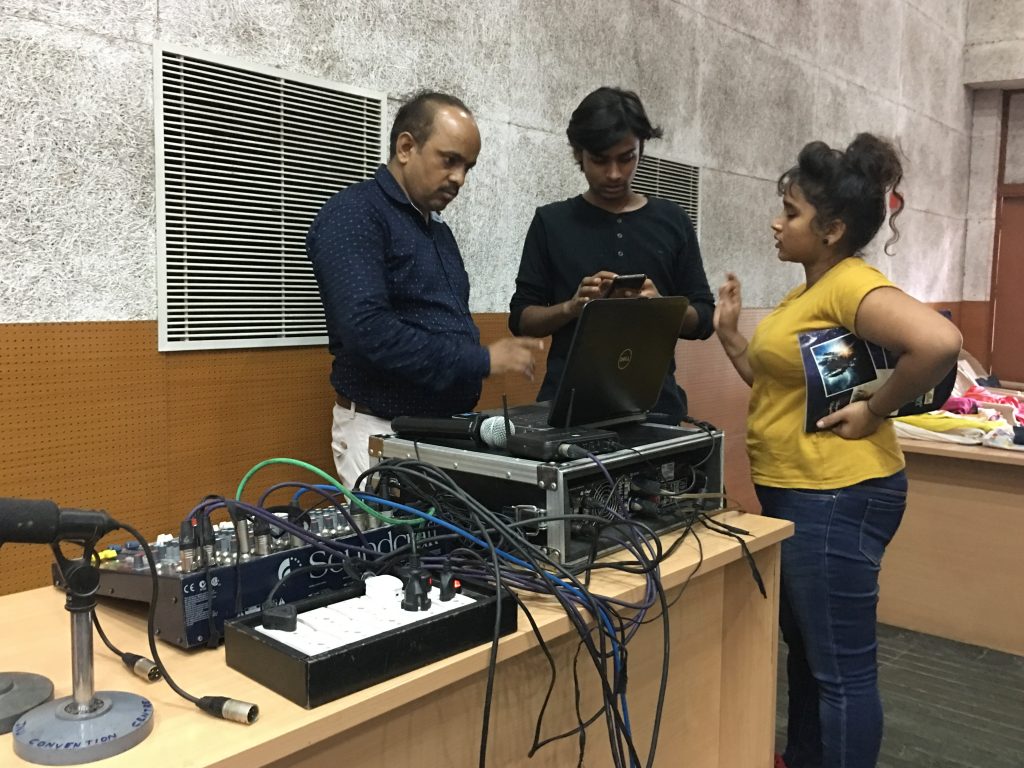
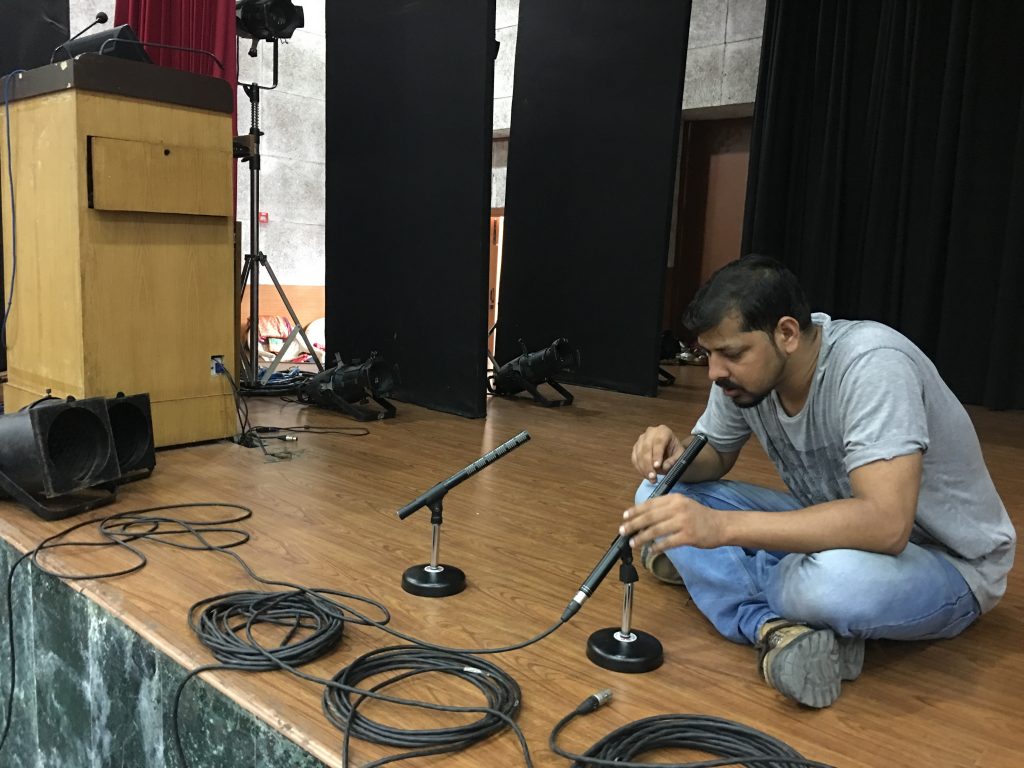
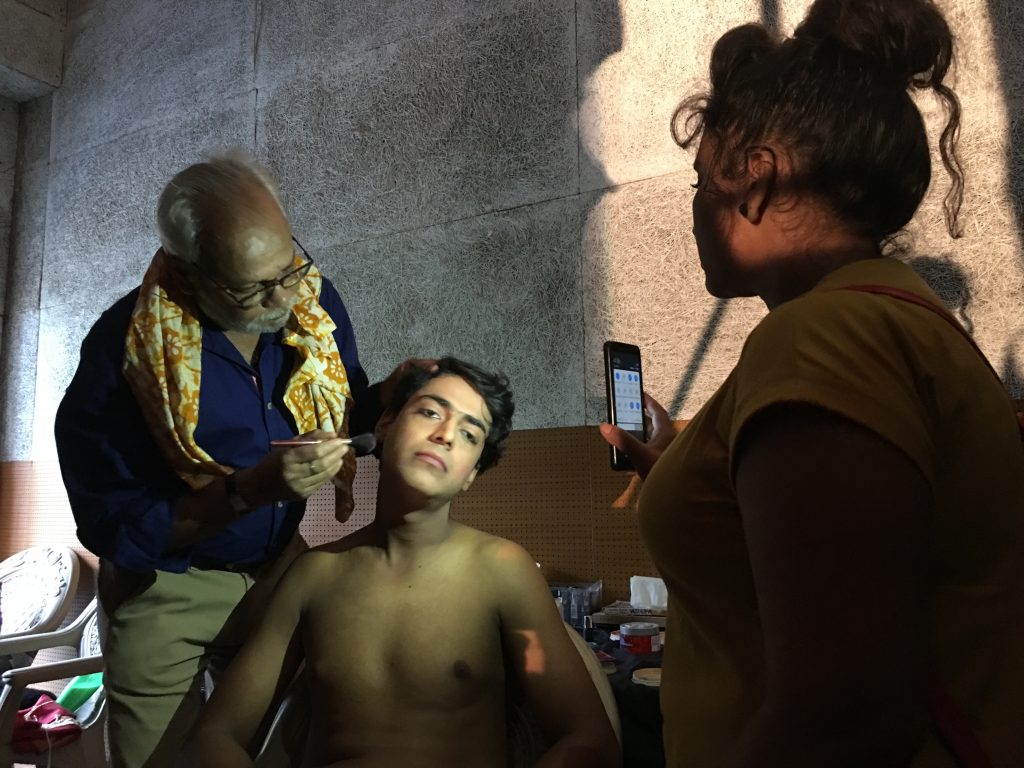
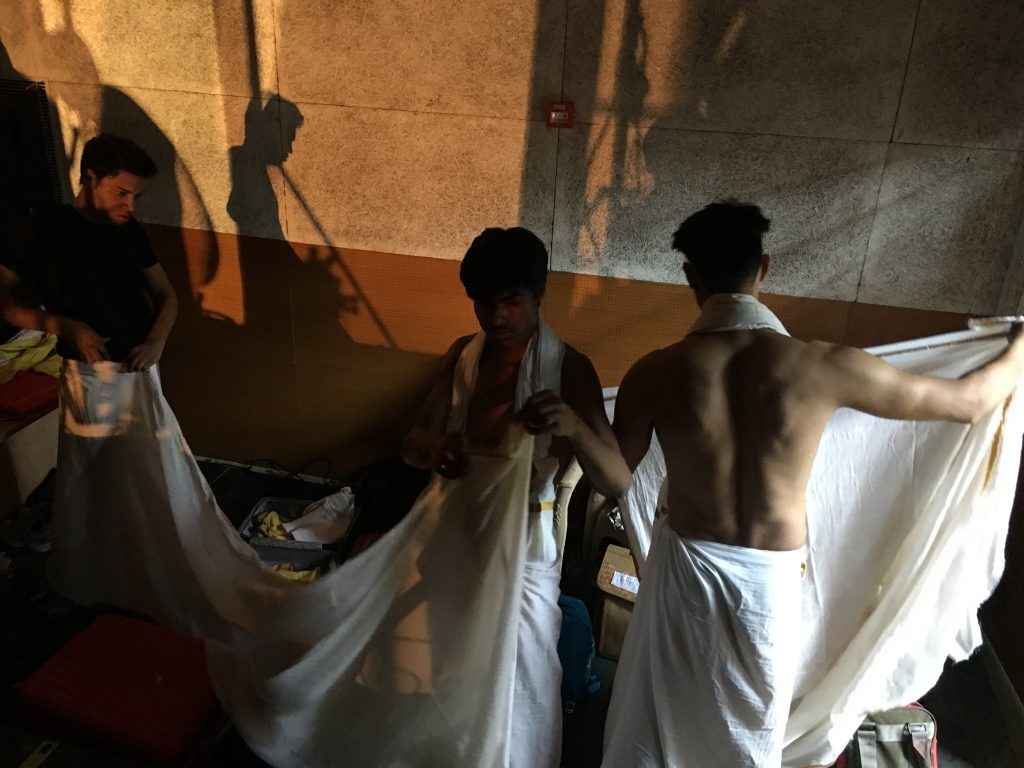
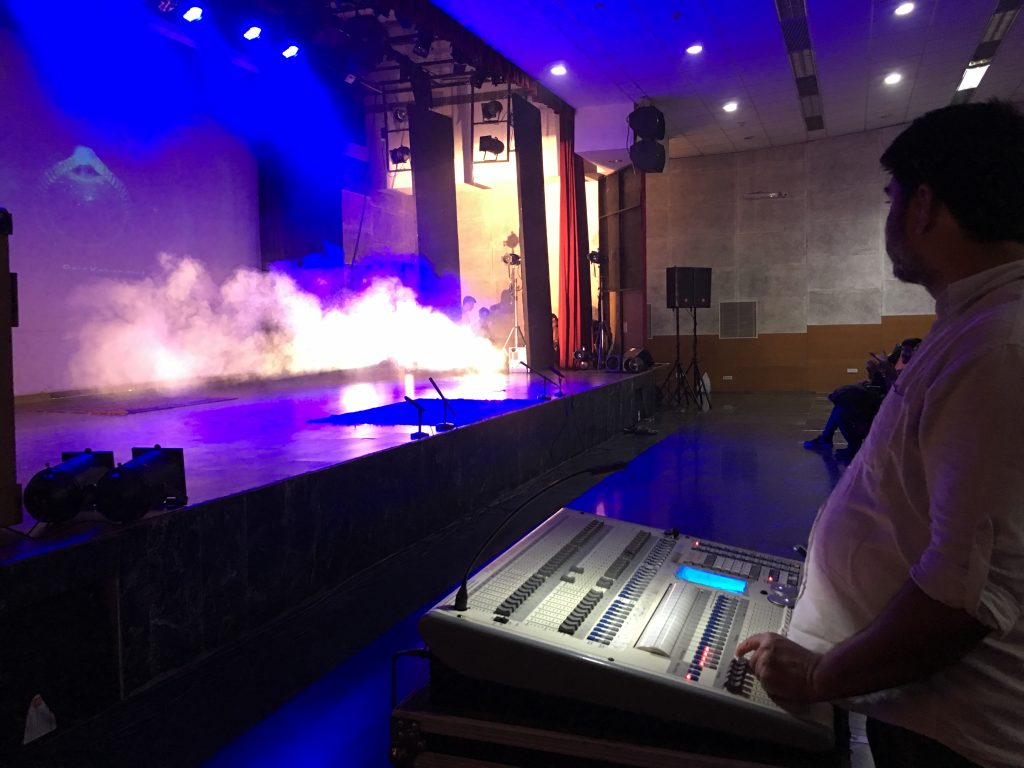

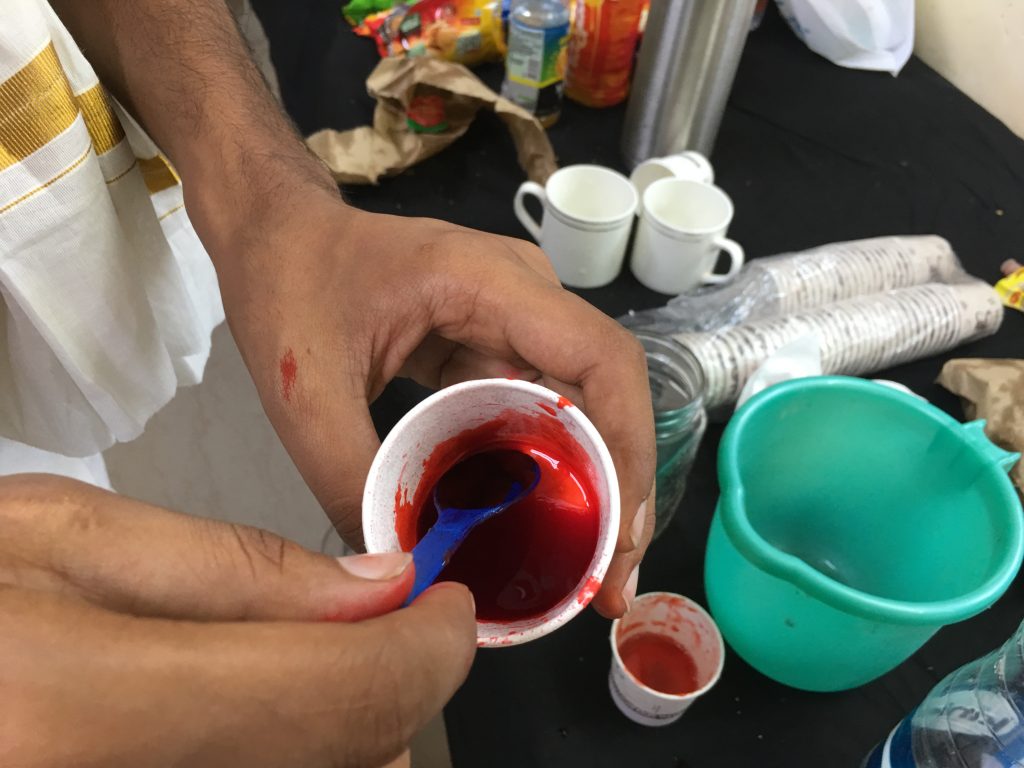
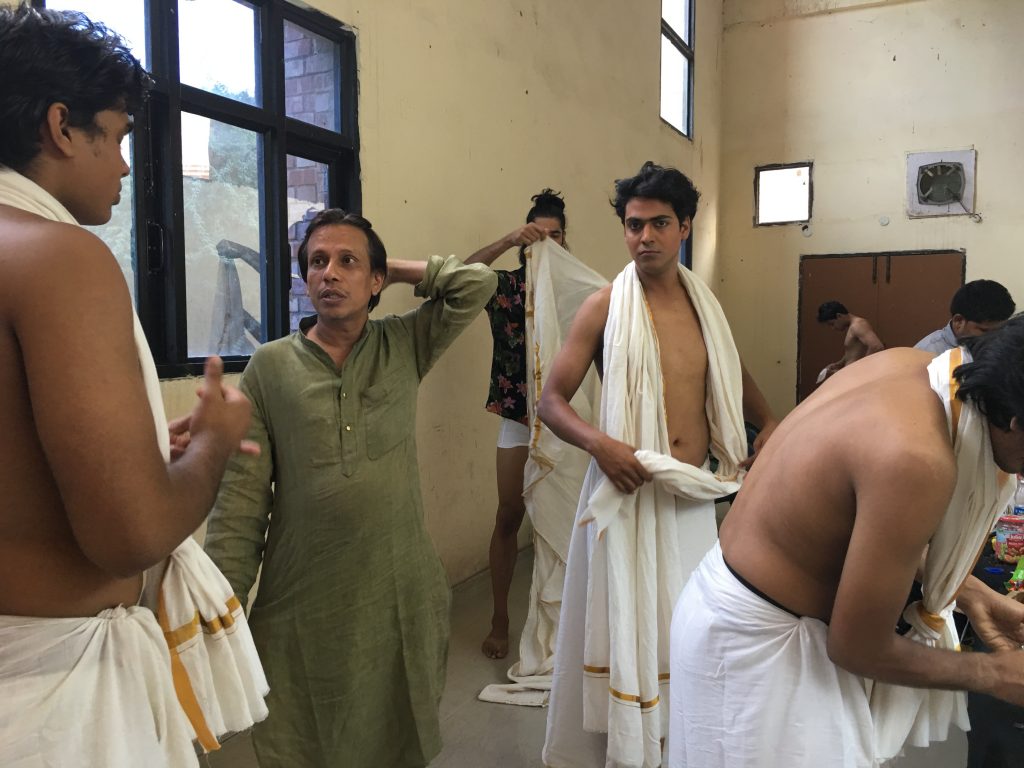
Back to ‘Poetics’ – I am meandering a bit too much nowadays; getting edgy with age.
Santanu is Associate Professor, World Drama, NSD. Just the right person to talk about storytelling means and modes of Greek Classical theatre; that apart, he always had this natural knack for co-relating the past and the present – without being over-the-top. When he explains, you relate with your own experiences, and understand.
I wanted to know more about ‘Poetics’ – for obvious reasons. All discussions on dramatic structure and characterization and plot development invariably end up pointing at that ancient treatise. There’s no avoiding ‘Poetics’.
But what’s so special about it? Why has it stayed on and on…?
I asked Santanu, and he was all too happy to oblige.
The first part of our discussion is about the components of dramatic storytelling in ‘Poetics’ – and the ’why’ of the enigmatic concept of ‘tragic flaw’ in protagonists that leads to their massive fall.
Santanu opines that propagating a sense of ‘pity’ and ‘fear’ for the main protagonist was a ploy to promote mediocrity among citizens of ancient Greece – a leash to keep them within their ‘democratic’ confines – and not aspire to be ‘great’.
Quite relevant; at least to the version of democracy we practice here and now. If you find this familiar, don’t blame me. For me, it’s all Greek.
That’s part one. Personally, both me any young friend Manan who recorded and edited the interview liked the content so much, that we didn’t have the courage to edit it too much. It’s longish in terms of today’s attention spans – but we felt it was engrossing.
Hence, it’s in two parts. In a few days, we will bring you part two of the interview.
That will be about Aristotle’s views on dramatic structure and its implications on modern cinematic storytelling; good dope for screenwriters, that one – but in just a few days.


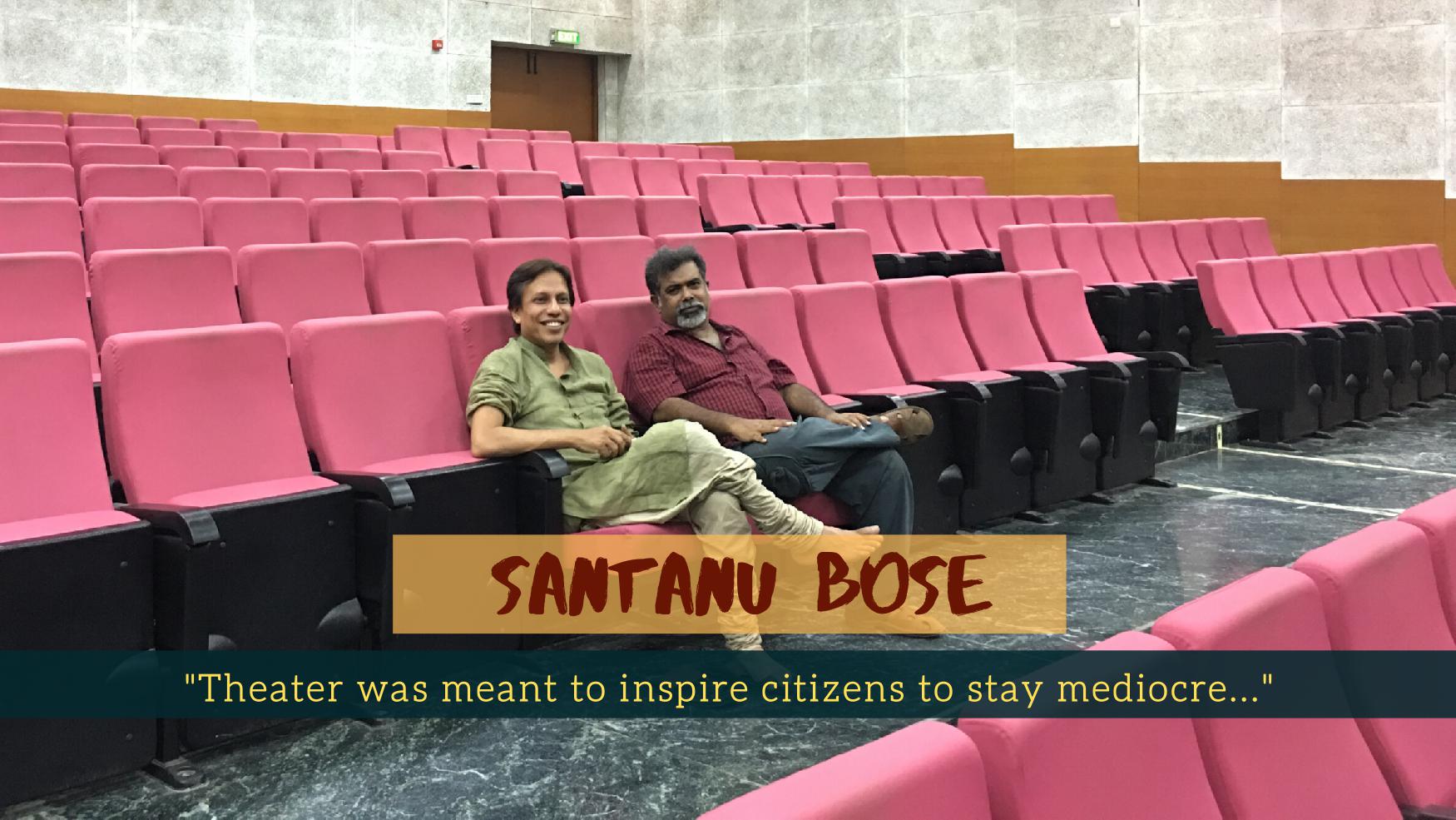
Very aptly timed. Only last week I was traveling with a theater group, doing shows at 4 different cities, and the sound guy bailed out at the last moment, leaving me to fill in for live audio…which I had no clue of, whatsoever, while also playing my part on stage. I took it as a challenge and manged a decent job, if not great…definitely an interesting experience though.
Very nice Rajneesh. Live sound designing is at the heart of sync sound. Once you get into that domain – it’s up, up, and above…all the way.
Not really into that domain, just exploring the theatre form by flirting with its different mediums till I get to do one of my own. Thats the own way non academic, yet curious guys like me get to do stuff.
By sync sound I didn’t mean theater. And yes, I appreciate your flirting with various mediums of storytelling. That’s what I am doing as well.
Reading your blog, it’s a temptation to experience the ambience backstage…..however deriving vicarious pleasure through your narrative 🙂
Watch the video Papia. I know you will enjoy his unique perspective.